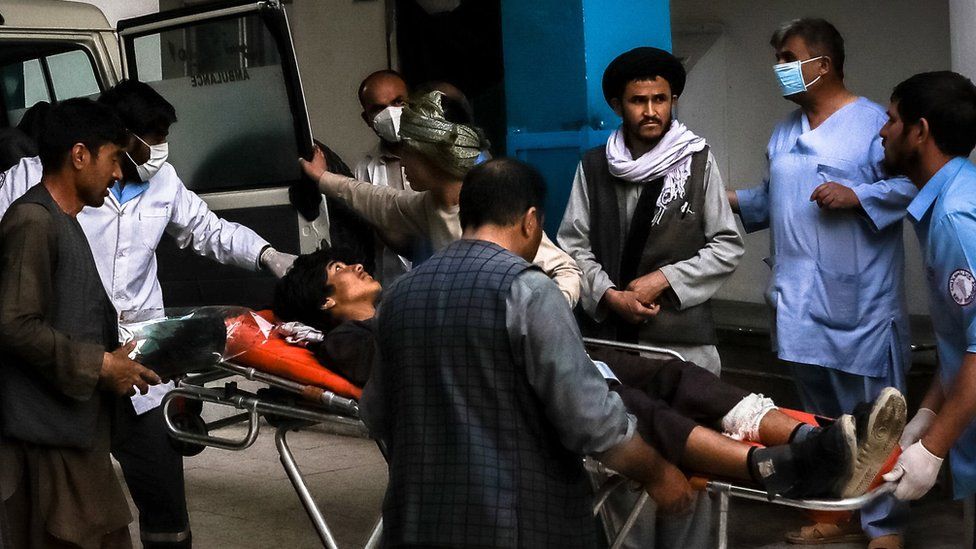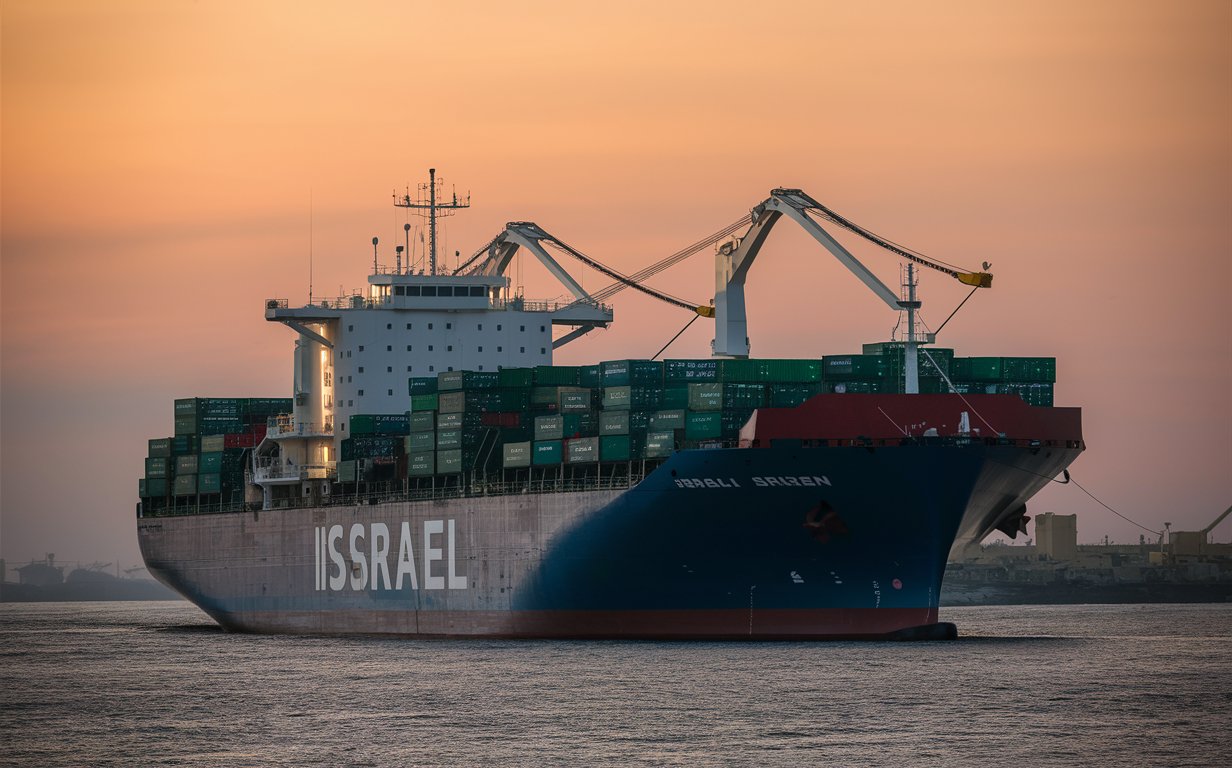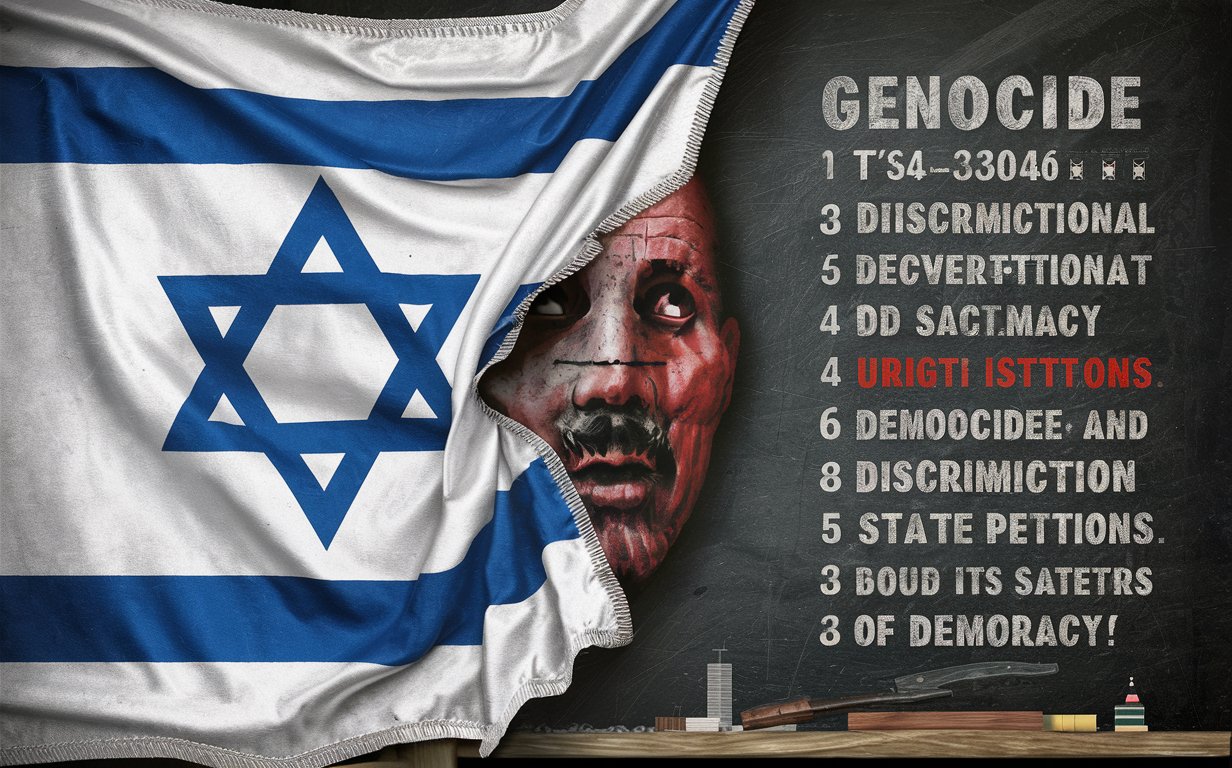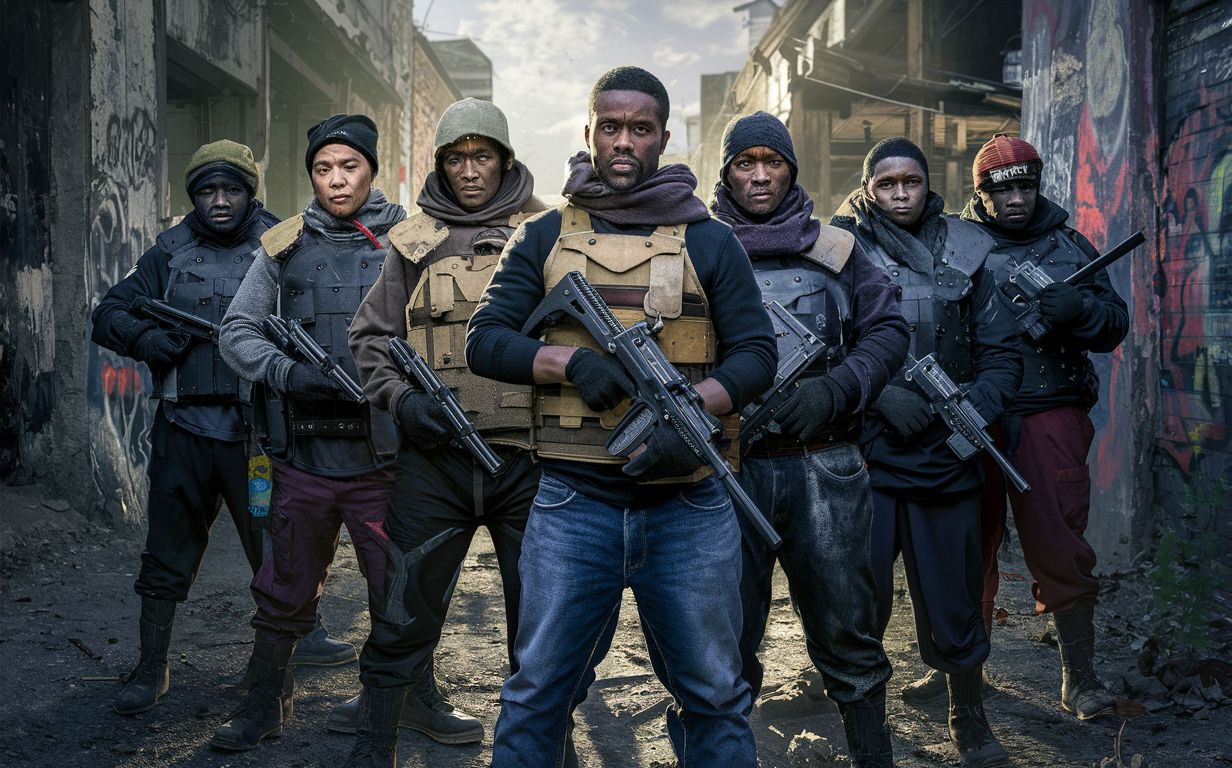Conflict
PAKISTAN STRONGLY CONDEMNS ATTACKS AT A SCHOOL IN KABUL, AFGHANISTAN

Pakistan strongly condemns the reprehensible attacks at a school in Kabul, Afghanistan which led to loss of many precious lives and injuries. The Government and the people of Pakistan offer heartfelt condolences to the Government and the people of Afghanistan and pray for quick recovery of the injured.

Pakistan condemns terrorism in all forms and manifestations. At this moment of grief, Pakistan stands by Afghan brethren in their struggle against the scourge of terrorism. Pakistan will continue to support Afghanistan on its path to peace, progress and prosperity.
Pakistan always wanted a peaceful and stable Afghanistan and has taken various initiatives to restore peace in Afghanistan .
Conflict
Iran Seizes Israel-Linked Container Vessel Following Suspected Israeli Air Strike on Consular Building in Damascus

Iran has seized an Israel-linked container vessel in response to a suspected Israeli air strike on its consular building in Damascus. The seizure of the vessel is the latest in a series of incidents between Iran and Israel, highlighting the ongoing tensions between the two countries.

The vessel, which was reportedly carrying a cargo of chemicals, was seized in the Persian Gulf and taken to an Iranian port for inspection. The incident has raised concerns about the safety of shipping in the region, as tensions between Iran and Israel continue to simmer. The Israeli government has not commented on the incident, but it is believed that the vessel was owned by an Israeli company.
The seizure of the vessel comes amid rising tensions between Iran and Israel, which have been exacerbated by a series of incidents in recent months. In addition to the suspected air strike on the Iranian consular building in Damascus, there have been a number of other incidents, including attacks on Israeli-owned ships and alleged sabotage at an Iranian nuclear facility. The situation is likely to remain tense, with both sides vowing to respond to any further provocations.
Table of Contents
Iran’s Seizure of Israeli-Linked Vessel

Circumstances of the Seizure
On April 13, 2024, Iran’s Revolutionary Guard Corps (IRGC) seized an Israeli-linked container vessel in the Persian Gulf, claiming it had violated Iranian territorial waters. The vessel, named MV Rachel, was reportedly owned by an Israeli shipping company and was sailing from the UAE to India when it was intercepted by Iranian naval forces.
According to Iranian state media, the vessel was carrying “contraband” and was seized in accordance with Iran’s maritime laws. However, Israeli officials have denied any wrongdoing and accused Iran of using the seizure as a pretext to escalate tensions in the region.
International Response
The seizure of the MV Rachel has drawn condemnation from the international community, with many countries calling for the immediate release of the vessel and its crew. The United States, the United Kingdom, France, and Germany have all issued statements expressing concern over the incident and calling for a peaceful resolution to the crisis.
Israel has not yet commented on the seizure, but the country’s defence minister has warned that Israel will not tolerate any threats to its security and will take all necessary measures to protect its interests.
The seizure of the MV Rachel comes amid rising tensions between Iran and Israel, following a suspected Israeli air strike on Iran’s consular building in Damascus. Tehran has vowed to respond to the attack, raising fears of a wider conflict in the region.
Suspected Israeli Air Strike in Damascus

On April 13, 2024, Tehran vowed to respond to a suspected Israeli air strike on its consular building in Damascus. The attack reportedly occurred on April 12, 2024, and targeted the Iranian Consulate in Damascus. While there are no official reports of casualties or damage, the attack has been condemned by the Iranian government.
Details of the Attack
The details of the attack are still unclear, but it is suspected that Israeli forces were responsible. The Israeli government has not officially claimed responsibility for the attack. However, Israel has been known to carry out similar attacks in the past, targeting Iranian military and diplomatic installations in Syria.
Iran’s Vow for Retaliation
In response to the suspected Israeli air strike, Tehran has vowed to retaliate. Iranian officials have not provided any details on what form the retaliation will take, but have warned that Israel will face consequences for its actions.
The attack on the Iranian Consulate in Damascus comes amid rising tensions between Iran and Israel. The two countries have been engaged in a long-standing conflict, with Israel accusing Iran of supporting terrorist groups and pursuing nuclear weapons. Iran, in turn, has accused Israel of carrying out attacks on its nuclear facilities and assassinating its scientists.
The situation is likely to escalate further if Iran carries out its threat of retaliation. The international community has called for calm and urged both sides to exercise restraint.
Implications for Regional Stability

The seizure of an Israel-linked container vessel by Iran has raised concerns about the potential for escalation in the region. Tehran has accused Israel of being behind a suspected air strike on its consular building in Damascus and has vowed to respond.
The incident highlights the ongoing tensions between Iran and Israel, which have been at odds for decades. It also underscores the broader geopolitical challenges facing the Middle East, where various actors are competing for influence and power.
The implications for regional stability are significant. The seizure of the vessel could lead to further tit-for-tat actions between Iran and Israel, potentially escalating into a wider conflict. It could also strain relations between Iran and other countries in the region, including Saudi Arabia and the United Arab Emirates, which have been critical of Iran’s actions in the past.
Moreover, the incident could have economic consequences, as it could disrupt shipping routes in the region and affect the flow of goods. This could have a ripple effect on global trade and the wider economy.
Overall, the situation underscores the need for diplomacy and dialogue to resolve the underlying issues driving these tensions. It also highlights the importance of regional cooperation and the need for all parties to work together to promote stability and security in the Middle East.
Conflict
The Israeli Colonial-Settler State Unmasked: Democracy No Barrier to Genocide

The Israeli colonial settler state has been a topic of controversy for decades. The idea of a state based on the colonisation of another people’s land has been criticised by many as a violation of human rights and international law. The recent unmasking of the Israeli colonial settler state has brought these criticisms to the forefront of international attention.

Israel’s democracy has been touted by many as a model for the Middle East. However, the reality is that the Israeli state has been accused of committing genocide against the Palestinian people. This accusation is not new, but it has gained traction in recent years as more and more evidence has come to light. Just like the historic Anglo-American colonialism in the US, Canada and Australia, Israel’s democracy has not been a barrier to genocide.
The unmasking of the Israeli colonial-settler state has been a long time coming. The international community has been calling for an end to Israel’s occupation of Palestinian land for decades. However, it is only in recent years that the world has begun to see the true nature of the Israeli state. The evidence of genocide and human rights violations has become too overwhelming to ignore.
Table of Contents
Historical Context of Israeli Settlements

Origins of Israeli Colonial-Settler State
The establishment of the Israeli state in 1948 marked the beginning of a long-standing conflict with the Palestinian people. Israel’s occupation of Palestinian land and the construction of settlements in the West Bank and Gaza Strip have been a source of tension and violence for decades. The Israeli colonial-settler state has been unmasked for what it is, with its policies of ethnic cleansing, displacement, and genocide being exposed for the world to see.
The origins of the Israeli colonial-settler state can be traced back to the early Zionist movement, which advocated for the creation of a Jewish homeland in Palestine. In the early 20th century, Jewish settlers began to arrive in Palestine, purchasing land from absentee landlords and displacing Palestinian farmers. This process of colonization continued after the establishment of the Israeli state in 1948, with the Israeli government actively promoting the settlement of Jewish Israelis in the West Bank and Gaza Strip.
Comparative Analysis of Anglo-American Colonialism
The Israeli colonial-settler state shares many similarities with historic Anglo-American colonialism in the US, Canada, and Australia. Like these former colonial powers, Israel has used violence, displacement, and genocide to maintain its control over Palestinian land. Israel’s democracy is no barrier to these policies, as evidenced by the ongoing occupation and settlement of Palestinian land.
One key difference between Israeli colonialism and Anglo-American colonialism is the role of religion in the former. While Anglo-American colonialism was often justified on secular grounds, such as the need for resources or the spread of civilization, Israeli colonialism is rooted in religious beliefs about the Jewish people’s rightful claim to the land of Israel. This has led to a particularly brutal form of colonialism, with Israeli settlers often using violence and intimidation to displace Palestinian families from their homes.
In conclusion, the historical context of Israeli settlements is rooted in the early Zionist movement’s desire for a Jewish homeland in Palestine. The Israeli colonial-settler state has been unmasked for what it is, with its policies of ethnic cleansing, displacement, and genocide being exposed for the world to see. The similarities between Israeli colonialism and historic Anglo-American colonialism are striking, with both using violence and displacement to maintain control over colonized lands.
Democracy and Its Limits
Mechanisms of Israeli Democracy
Israel has long been touted as a democratic state in the Middle East. However, the reality is that the mechanisms of Israeli democracy have been used to systematically oppress and disenfranchise the Palestinian people. The Israeli government has used a variety of tactics, such as gerrymandering and discriminatory laws, to ensure that Palestinians are not able to fully participate in the democratic process.
For example, the Israeli government has implemented a number of laws that discriminate against Palestinians, such as the “Jewish Nation-State Law” which declares that only Jewish people have the right to self-determination in Israel. This law effectively disenfranchises the Palestinian population and reinforces the idea that Israel is a colonial-settler state.
Democratic Facade and Human Rights Violations
Despite claims of being a democratic state, Israel has a long history of human rights violations against the Palestinian people. These violations include the construction of illegal settlements in the West Bank, the use of excessive force against protesters, and the imposition of a blockade on the Gaza Strip.
Furthermore, Israel’s “democratic facade” has been used to justify these human rights violations. The Israeli government often claims that it is acting in the name of democracy and national security, but in reality, these actions are designed to maintain the status quo and ensure that Israel remains a colonial-settler state.
In conclusion, while Israel may claim to be a democratic state, the reality is that the mechanisms of Israeli democracy have been used to maintain a system of oppression and disenfranchisement against the Palestinian people. The so-called “democratic facade” has been used to justify human rights violations and maintain Israel’s status as a colonial-settler state.
International Perspectives and Responses

Global Reactions to Israeli Policies
The Israeli colonial-settler state has been criticized by many countries and international organizations for its policies towards Palestine. The United Nations has passed several resolutions condemning Israel’s actions, including the expansion of settlements in the West Bank and the Gaza Strip. In addition, many countries have imposed economic sanctions on Israel in an attempt to pressure it to change its policies.
One of the most significant global reactions to Israeli policies is the Boycott, Divestment and Sanctions (BDS) movement. The BDS movement aims to put economic and political pressure on Israel to end its occupation of Palestine, dismantle the separation wall, and grant equal rights to Palestinian citizens of Israel. The movement has gained significant support from civil society organizations, trade unions, and political parties around the world.
The Role of International Law
International law has played a significant role in addressing Israeli policies towards Palestine. The International Court of Justice (ICJ) has issued several advisory opinions on the legal status of the Israeli settlements in the West Bank and the Gaza Strip. The ICJ has ruled that the settlements are illegal under international law and that Israel is obliged to dismantle them.
In addition, the United Nations Human Rights Council (UNHRC) has established a commission of inquiry to investigate the Israeli military’s conduct during the 2018 Gaza protests. The commission found that Israeli soldiers had committed war crimes and crimes against humanity by using excessive force against unarmed protesters.
Despite these international efforts, Israel continues to violate international law with impunity. The lack of accountability for Israeli officials has led to widespread criticism of the international community’s failure to take effective action to end the occupation of Palestine.
Conflict
Defending Haiti: Inside the Brave World of Neighborhood Vigilantes Standing ‘Tooth and Nail’ Against Gang Violence

Table of Contents
Introduction
We shall attempt to investigate the tale of a neighbourhood in the capital of Haiti that is disproportionately affected by violence and unrest. The people have chosen to take matters into their own hands and become vigilantes, fighting back against gang attacks despite the odds being stacked against them. Their bravery, tenacity, and fortitude in the face of hardship are highlighted throughout the story. In the face of dread and uncertainty, these common people have transformed into heroes by putting their lives in danger to protect their neighbourhoods and homes. It is an engrossing story about the struggle for justice and freedom by the human soul.
Understanding the Context
Haiti, a nation plagued by political instability and economic challenges, has long grappled with high levels of crime and violence. In the capital city, Port-au-Prince, residents navigate a landscape marred by frequent acts of brutality, where murders often go unsolved, leaving communities in a state of perpetual unease.
The Rise of Vigilantism
Amidst this turmoil, a remarkable phenomenon has emerged – ordinary citizens turning into vigilantes to protect their neighbourhoods. Faced with the constant threat of gang violence, these brave individuals have taken it upon themselves to stand up against the forces of chaos and lawlessness.
Profiles in Courage
Meet the men and women who have chosen to defy fear and fight back. Through interviews and firsthand accounts, we explore the stories of those who are willing to “give their heart and soul for the freedom of the neighborhood, and the freedom of this country.” Their unwavering determination and sense of duty paint a portrait of extraordinary heroism in the face of danger.
Challenges and Sacrifices
Delve into the challenges faced by these vigilantes as they navigate a treacherous path between justice and vigilantism. From personal risks to societal implications, we examine the complexities inherent in taking up arms against criminal elements in a society where trust in traditional authorities is often eroded.
Impact on Community Dynamics
Explore how the presence of vigilantes has reshaped community dynamics in Haiti. From instilling a sense of security to fostering solidarity among residents, we analyze the ripple effects of grassroots efforts to combat crime and uphold order in an environment fraught with uncertainty.
The Call for Change
As vigilantes continue to defend their neighbourhoods with unwavering resolve, questions arise about the broader implications for Haiti’s future. What does this grassroots movement signify for governance, security, and social cohesion in a nation grappling with multifaceted challenges?
Conclusion: A Beacon of Hope
In conclusion, the story of vigilantes defending Haiti’s neighbourhoods serves as a poignant reminder of human resilience in the face of adversity. Their courage shines as a beacon of hope amidst the darkness, inspiring us to reflect on the power of community action and individual agency in shaping a brighter tomorrow.
-

 Featured3 years ago
Featured3 years agoThe Right-Wing Politics in United States & The Capitol Hill Mayhem
-

 Elections 20241 month ago
Elections 20241 month agoAnalyzing Trump’s Super Tuesday Triumph and Nikki Haley’s Strategic Moves
-

 News2 years ago
News2 years agoPrioritizing health & education most effective way to improve socio-economic status: President
-

 China3 years ago
China3 years agoCoronavirus Pandemic and Global Response
-

 Canada3 years ago
Canada3 years agoSocio-Economic Implications of Canadian Border Closure With U.S
-

 Conflict3 years ago
Conflict3 years agoKashmir Lockdown, UNGA & Thereafter
-

 Democracy3 years ago
Democracy3 years agoMissing You! SPSC
-

 Democracy3 years ago
Democracy3 years agoPresident Dr Arif Alvi Confers Civil Awards on Independence Day























